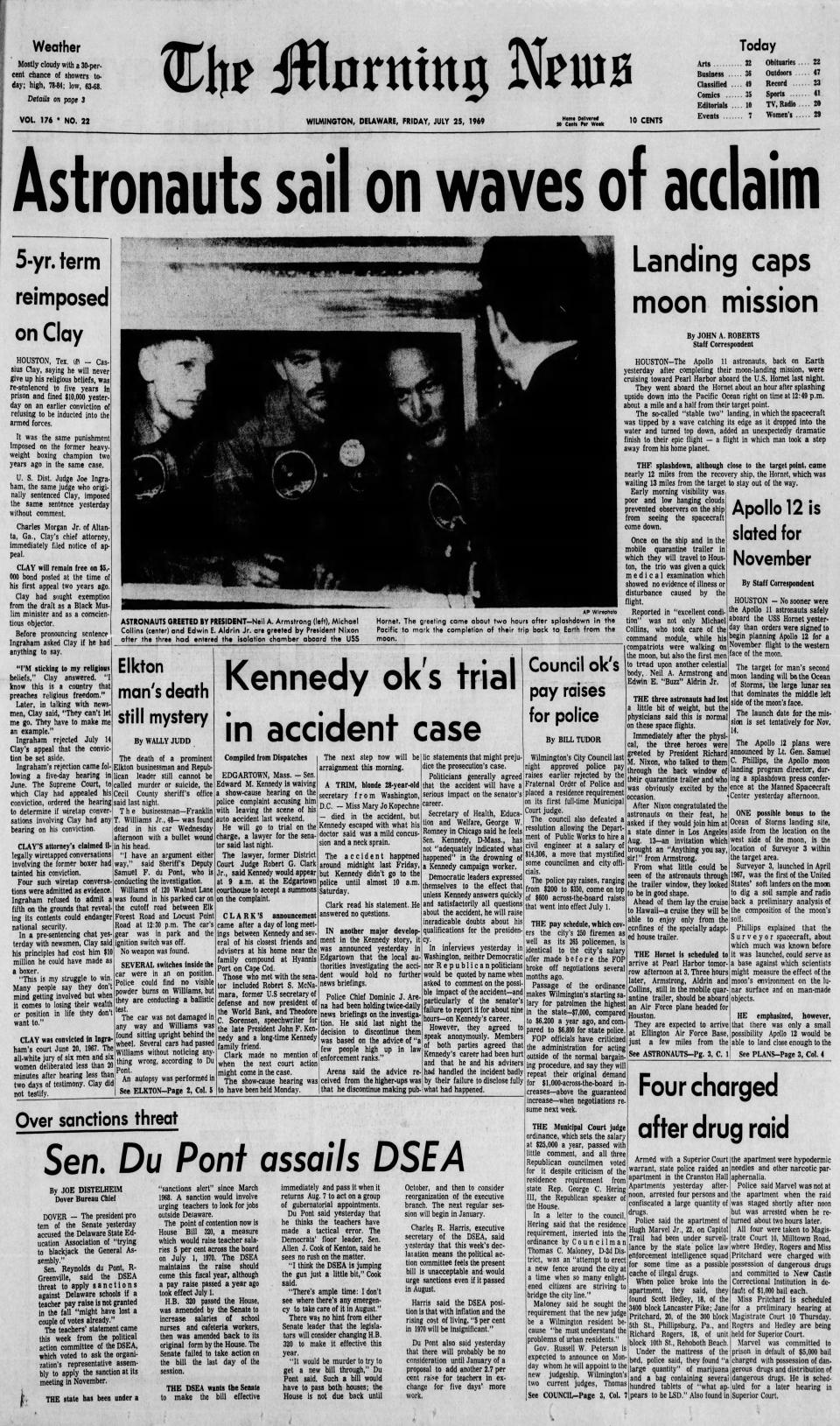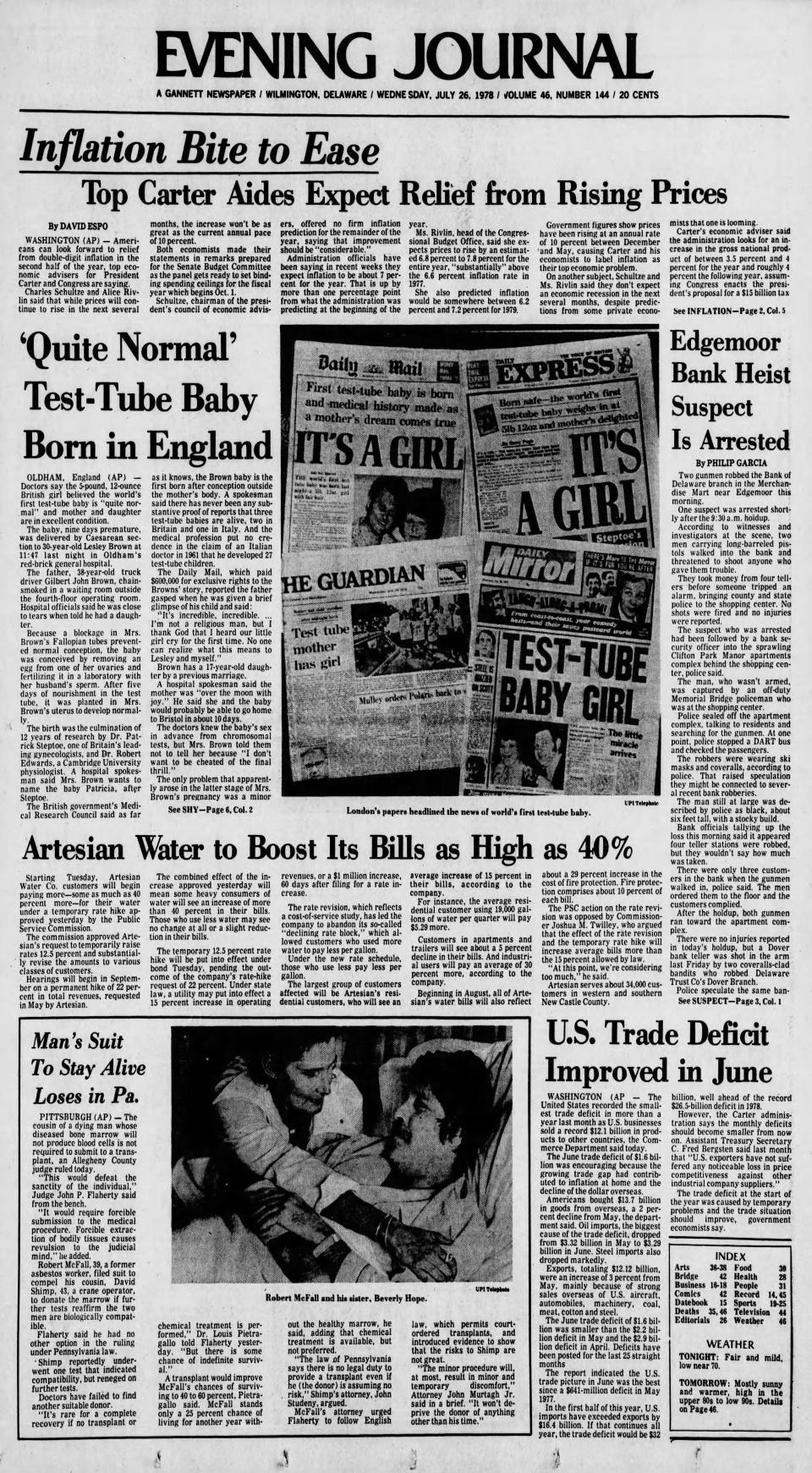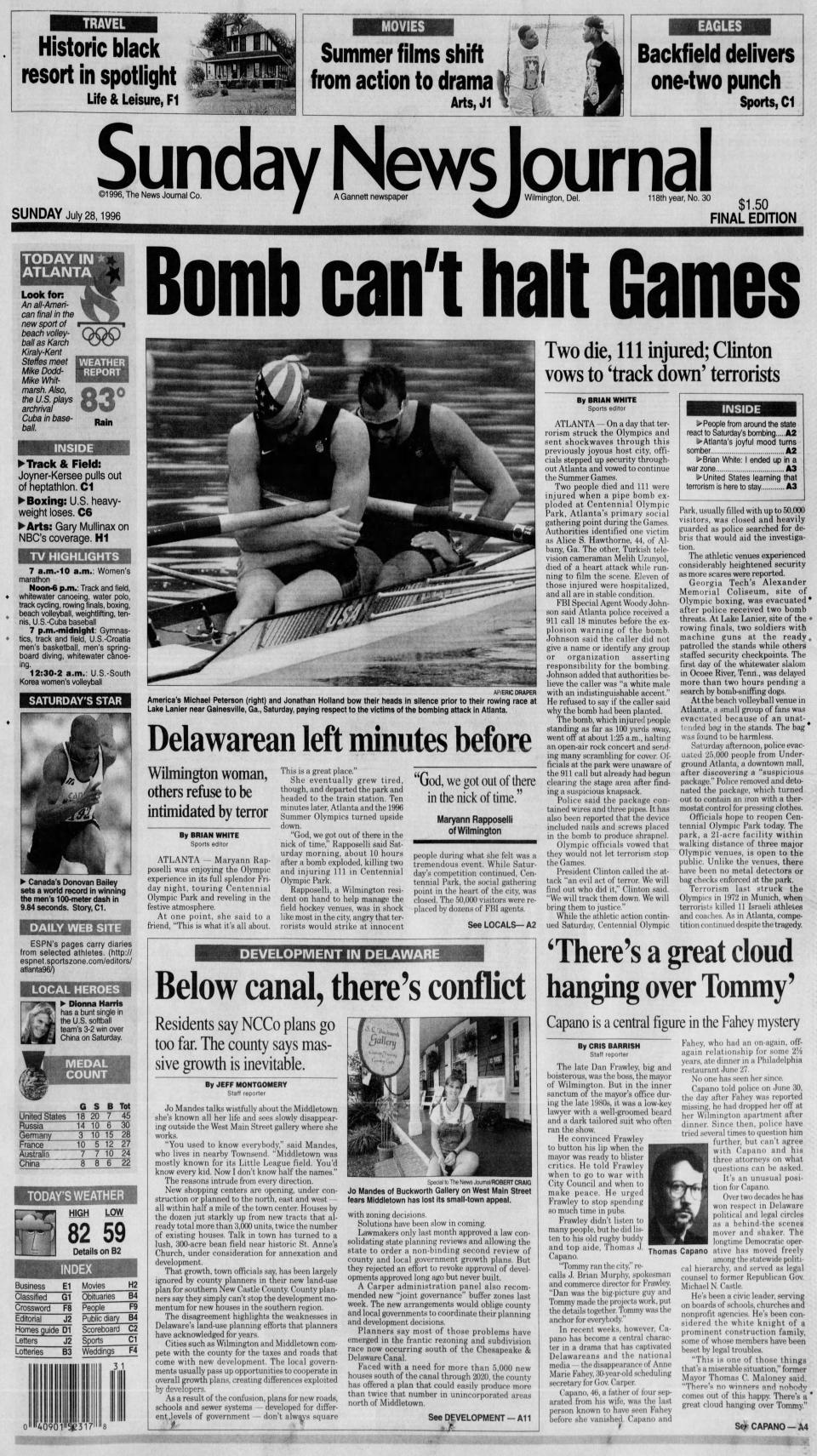Coal strike, test-tube baby, Olympic bombing. News Journal archives for week of July 24
"Pages of history" features excerpts from The News Journal archives including the Wilmington Morning News and the Evening Journal.
July 24, 1922, Wilmington Morning News
Tribunal urged for President to end coal strike
President Harding was urged to appoint immediately a non-partisan fact-finding tribunal to inquire into the coal situation in a telegram sent tonight by A.M. Ogle, president of the National Coal Association. The President announced the consideration of such a commission last week….
Operators from the coal-producing districts of six states will be asked tomorrow by Secretary Hoover to cooperate with the government and the railroads in a plan to insure the distribution of fuel to the carriers and public utilities and to prevent profiteering during the strike emergency….
A striking miner and his wife were wounded in a shooting at a tent colony near the Footedale mine of the H.C. Frick Coke Company yesterday near Uniontown, Pa. Four deputy sheriffs were arrested.
The deputies, according to reports to Sheriff I.I. Shaw, were en route to a mine at Collier, where they were on duty as guards. Their automobile stopped at the tent colony when the gasoline supply was exhausted.
The deputies got into an argument with a striker, and four shots were fired. One bullet went into a tent occupied by William Collins. It struck Collins in the wrist, was deflected by a bone, and then went through Mrs. Collins’ right arm. State troopers were called from Newsalem and they arrested three of the deputies at Footedale. The fourth was arrested at Collier.
RECENT ENERGY NEWSGas soars above $5 per gallon in Delaware. Drivers, businesses and nonprofits feel the pain.
July 25, 1969, The Morning News
Astronauts sail on waves of acclaim; Landing caps moon mission
The Apollo 11 astronauts, back on Earth yesterday after completing their moon-landing mission, were cruising toward Pearl Harbor about the U.S. Hornet last night.
They went aboard the Hornet about an hour after splashing upside down into the Pacific Ocean right on time at 12:49 p.m. about a mile and a half from their target point.

The so-called “stable two” landing, in which the spacecraft was tipped by a wave catching its edge as it dropped into the water and turned top down, added an unexpectedly dramatic finish to their epic flight – a flight in which man took a step away from his home planet….
Reported in “excellent condition” was not only Michael Collins, who took care of the command module while his compatriots were walking on the moon, but also the first men to tread upon another celestial body, Neil A. Armstrong and Edwin E. “Buzz” Aldrin Jr.
Immediately after the physical, the three heroes were greeted by President Richard M. Nixon, who talked to them through the back window of their quarantine trailer and who was obviously excited by the occasion….
July 26, 1978, Evening Journal
‘Quite normal’ test-tube baby born in England
Doctors say the 5-pound, 12-ounce British girl believed the world’s first test-tube baby is “quite normal” and mother and daughter are in excellent condition.
The baby, nine days premature, was delivered by Caesarean section to 30-year-old Lesley Brown at 11:47 last night in Oldham’s red-brick general hospital.

The father, 38-year-old truck driver Gilbert John Brown, chain-smoked in a waiting room outside the fourth-floor operating room. Hospital officials said he was close to tears when told he had a daughter.
Because of a blockage in Mrs. Brown’s fallopian tubes prevented normal conception, the baby was conceived by removing an egg from one of her ovaries and fertilizing it in a laboratory with her husband’s sperm. After five days of nourishment in the test tube, it was planted in Mrs. Brown’s uterus to develop normally.
The birth was the culmination of 12 years of research by Dr. Patrick Steptoe, one of Britain’s leading gynecologists, and Dr. Robert Edwards, a Cambridge University physiologist….
CATCH UP ON HISTORY:News Journal archives, week of May 8
July 28, 1996, Sunday News Journal
Bomb can’t halt Olympic Games; Two die, 111 injured in Atlanta
On a day that terrorism struck the Olympics and sent shockwaves through this previously joyous host host city, officials stepped up security throughout Atlanta and vowed to continue the Summer Games.
Two people died and 111 were injured when a pipe bomb exploded at Centennial Olympic Park, Atlanta’s primary social gathering point during the Games. Authorities identified one victim as Alice S. Hawthorne, 44, of Albany, Ga. The other, Turkish television cameraman Melih Uzunyol, died of a heart attack while running from the scene.

Eleven of those injured were hospitalized, and all are in stable condition.
FBI Special Agent Woody Johnson said Atlanta police received a 911 call 18 minutes before the explosion, warning of the bomb. Johnson said the caller did not give any name or identify any group asserting responsibility for the bombing….
The bomb, which injured people standing as far as 100 yards away, went off at about 1:25 a.m., halting an open-air rock concert and sending many scrambling for cover.
Officials at the part were unaware of the 911 call but already had begun clearing the stage area after finding a suspicious knapsack….
Olympic officials vowed that they would not let terrorism stop the Games.
President Clinton called the attack “an evil act of terror. We will find out who did it,” Clinton said. “We will track them down. We will bring them to justice.”
Reach reporter Ben Mace at rmace@gannett.com.
This article originally appeared on Delaware News Journal: News Journal archives with Apollo 11 returns, Atlanta Olympic bombing

